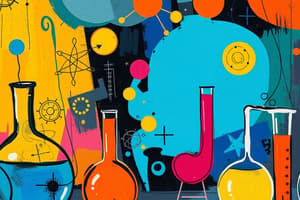Podcast
Questions and Answers
What is the first step of the scientific method?
What is the first step of the scientific method?
- Experiment
- Observation (correct)
- Hypothesis
- Analysis
Which branch of science focuses on matter and energy?
Which branch of science focuses on matter and energy?
- Physical sciences (correct)
- Earth sciences
- Life sciences
- Interdisciplinary science
What is a characteristic of a scientific theory?
What is a characteristic of a scientific theory?
- It is always a guess.
- It is consistent with existing knowledge. (correct)
- It only applies in specific situations.
- It cannot be modified.
What is the purpose of making a prediction in the scientific method?
What is the purpose of making a prediction in the scientific method?
Why is replicability important in scientific investigations?
Why is replicability important in scientific investigations?
Which of the following describes a scientific law?
Which of the following describes a scientific law?
Which of the following is an example of life sciences?
Which of the following is an example of life sciences?
What aspect of scientific theories allows them to be modified or replaced?
What aspect of scientific theories allows them to be modified or replaced?
What do scientific laws typically provide?
What do scientific laws typically provide?
Which of the following best describes scientific models?
Which of the following best describes scientific models?
Why is critical thinking important in science?
Why is critical thinking important in science?
What do accuracy and precision refer to in scientific measurement?
What do accuracy and precision refer to in scientific measurement?
What is a critical aspect of ethical considerations in scientific research?
What is a critical aspect of ethical considerations in scientific research?
What is the primary purpose of standardized systems of units in science?
What is the primary purpose of standardized systems of units in science?
Models of the solar system are an example of which type of model?
Models of the solar system are an example of which type of model?
Which statement best reflects the nature of scientific laws?
Which statement best reflects the nature of scientific laws?
Flashcards
What is science?
What is science?
A systematic approach to understanding the natural world, relying on observation, experimentation, and theory development.
What's a hypothesis?
What's a hypothesis?
A testable explanation for an observation.
What's a prediction?
What's a prediction?
A specific prediction about the outcome of an experiment.
What's a controlled experiment?
What's a controlled experiment?
Signup and view all the flashcards
What's a scientific theory?
What's a scientific theory?
Signup and view all the flashcards
Why is replicability important?
Why is replicability important?
Signup and view all the flashcards
What's a scientific law?
What's a scientific law?
Signup and view all the flashcards
What is interdisciplinary science?
What is interdisciplinary science?
Signup and view all the flashcards
Scientific Law
Scientific Law
Signup and view all the flashcards
Scientific Model
Scientific Model
Signup and view all the flashcards
Critical Thinking in Science
Critical Thinking in Science
Signup and view all the flashcards
Scientific Measurement Units
Scientific Measurement Units
Signup and view all the flashcards
Accuracy in Measurement
Accuracy in Measurement
Signup and view all the flashcards
Precision in Measurement
Precision in Measurement
Signup and view all the flashcards
Ethics in Scientific Research
Ethics in Scientific Research
Signup and view all the flashcards
Objectivity in Science
Objectivity in Science
Signup and view all the flashcards
Study Notes
The Scientific Method
- Science is a systematic approach to understanding the natural world.
- It relies on observation, experimentation, and the development of theories to explain natural phenomena.
- The scientific method is a framework for conducting scientific investigations.
- It involves several key steps:
- Observation: Noticing a phenomenon or pattern.
- Questioning: Asking a specific question about the observation.
- Hypothesis: Forming a testable explanation for the observation.
- Prediction: Making a specific prediction about the outcome of an experiment.
- Experiment: Designing and conducting an experiment to test the prediction.
- Analysis: Evaluating the results of the experiment.
- Conclusion: Drawing a conclusion based on the data collected, potentially supporting or rejecting the hypothesis.
- Scientific investigations often involve using controlled experiments to isolate variables and determine cause-and-effect relationships.
- Replicability is crucial; other scientists should be able to reproduce the experiment and get similar results for the conclusion to be considered valid.
Branches of Science
- Science is broadly divided into several branches, including:
- Physical sciences: Focus on matter, energy, and the forces that govern them. Includes physics, chemistry, and astronomy.
- Life sciences: Examine living organisms. Includes biology, zoology, botany, and ecology.
- Earth sciences: Study the Earth's structure, processes, and history. Includes geology, oceanography, and meteorology.
- Interdisciplinary science: many problems require combining ideas from various branches to find a solution. Example: environmental science draws upon concepts from physics, chemistry, biology, and geology.
Scientific Theories
- A scientific theory is a well-supported explanation of some aspect of the natural world.
- It's based on a vast amount of evidence gathered over time through observations and experiments.
- Theories can be modified or even replaced with new evidence, but they are not simply guesses.
- Key characteristics of a scientific theory include:
- It’s supported by substantial evidence.
- It’s consistent with existing knowledge.
- It's able to make accurate predictions.
- Examples of well-established scientific theories include the theory of evolution, the theory of plate tectonics, and the theory of relativity.
Scientific Laws
- A scientific law describes a fundamental relationship or pattern in nature.
- It is usually expressed as a mathematical equation or a concise statement.
- Laws summarize observed patterns and behaviors. Unlike theories, laws don't explain why these patterns exist.
- Examples include Newton's laws of motion and the law of conservation of energy.
Scientific Models
- Scientific models are simplified representations of complex phenomena.
- They can be physical, mathematical, or conceptual.
- Models help scientists visualize and understand concepts that are too complex to study directly or that cannot be manipulated in a lab.
- Examples include:
- Models of atoms, which describe the internal structure of matter.
- Models of the solar system, which visually represent the positions of celestial bodies.
- Mathematical models used in weather forecasting
Importance of Critical Thinking
- Critical thinking is essential in science.
- Scientists need to evaluate information carefully, identify biases, and consider alternative explanations.
- It helps to ensure that scientific conclusions are valid and reliable, and that the conclusions are grounded in evidence.
- Being critical and skeptical of scientific claims can reduce the spread of misinformation.
Scientific Measurement and Units
- Precise measurements are crucial in science.
- Standardized systems of units (like the SI system) are used globally for consistency and clarity.
- Key aspects of scientific measurement include:
- Accuracy: How close a measurement is to the true value.
- Precision: How repeatable a measurement is.
Ethics in Science
- Scientific research must adhere to ethical guidelines, ensuring the welfare and well-being of the subjects involved in scientific research.
- Ethical considerations are particularly important in research involving human subjects or living organisms – animal research and clinical trials, for instance.
- These considerations involve issues like informed consent, privacy, and the potential risks vs. benefits of research.
- Researchers should maintain objectivity to prevent personal biases from influencing experimental design, data analysis, or the drawing of inferences from collected data.
Studying That Suits You
Use AI to generate personalized quizzes and flashcards to suit your learning preferences.




